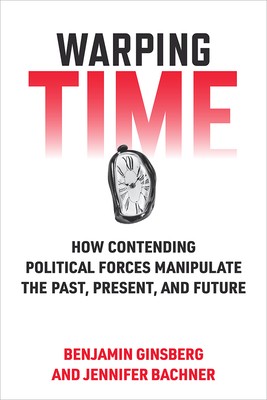
- We will send in 10–14 business days.
- Author: Benjamin Ginsberg
- Publisher: University of Michigan Press
- ISBN-10: 047205600X
- ISBN-13: 9780472056002
- Format: 15.2 x 22.6 x 1.2 cm, minkšti viršeliai
- Language: English
- SAVE -10% with code: EXTRA
Reviews
Description
Warping Time shows how narratives of the past influence what people believe about the present and future state of the world. In Benjamin Ginsberg and Jennifer Bachner's simple experiments, in which the authors measured the impact of different stories their subjects heard about the past, these "history lessons" moved contemporary policy preferences by an average of 16 percentage points; forecasts of the future moved contemporary policy preferences by an average of 12 percentage points; the two together moved preferences an average of 21 percentage points. And, in an Orwellian twist, the authors estimate that the "history lessons" had an average "erasure effect" of 8.5 percentage points--the difference between those with long-held preferences and those who did not recall that they previously held other opinions before participating in the experiment. The fact that the past, present, and future are subject to human manipulation suggests that history is not simply the product of impersonal forces, material conditions, or past choices. Humans are the architects of history, not its captives. Political reality is tenuous. Changes in our understanding of the past or future can substantially alter perceptions of and action in the present. Finally, the manipulation of time, especially the relationship between past and future, is a powerful political tool.
EXTRA 10 % discount with code: EXTRA
The promotion ends in 22d.10:41:47
The discount code is valid when purchasing from 10 €. Discounts do not stack.
- Author: Benjamin Ginsberg
- Publisher: University of Michigan Press
- ISBN-10: 047205600X
- ISBN-13: 9780472056002
- Format: 15.2 x 22.6 x 1.2 cm, minkšti viršeliai
- Language: English English
Warping Time shows how narratives of the past influence what people believe about the present and future state of the world. In Benjamin Ginsberg and Jennifer Bachner's simple experiments, in which the authors measured the impact of different stories their subjects heard about the past, these "history lessons" moved contemporary policy preferences by an average of 16 percentage points; forecasts of the future moved contemporary policy preferences by an average of 12 percentage points; the two together moved preferences an average of 21 percentage points. And, in an Orwellian twist, the authors estimate that the "history lessons" had an average "erasure effect" of 8.5 percentage points--the difference between those with long-held preferences and those who did not recall that they previously held other opinions before participating in the experiment. The fact that the past, present, and future are subject to human manipulation suggests that history is not simply the product of impersonal forces, material conditions, or past choices. Humans are the architects of history, not its captives. Political reality is tenuous. Changes in our understanding of the past or future can substantially alter perceptions of and action in the present. Finally, the manipulation of time, especially the relationship between past and future, is a powerful political tool.


Reviews